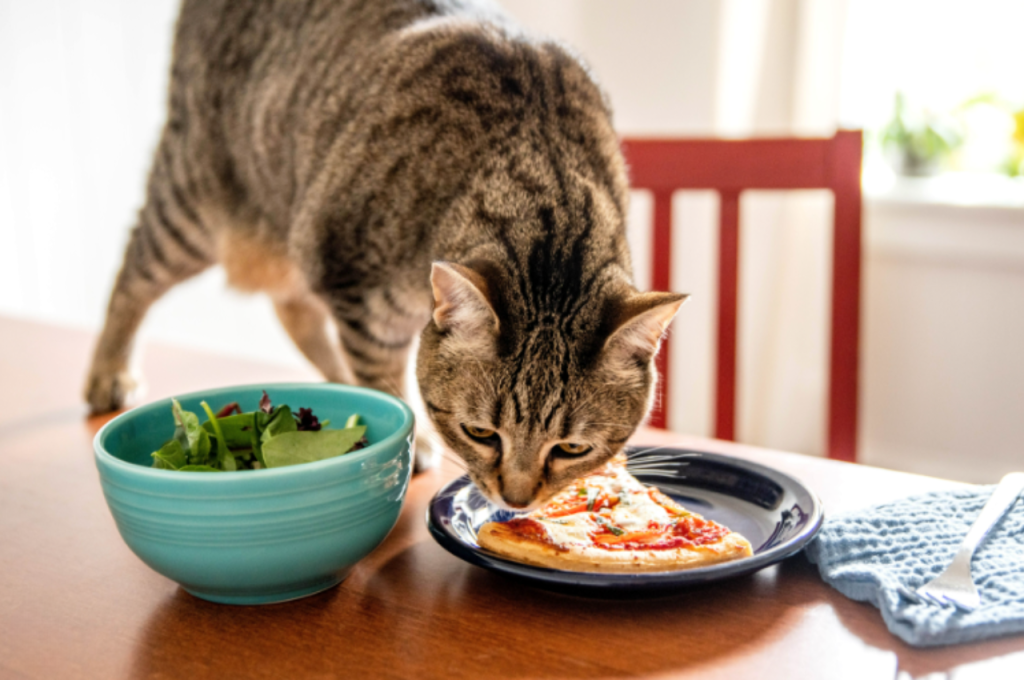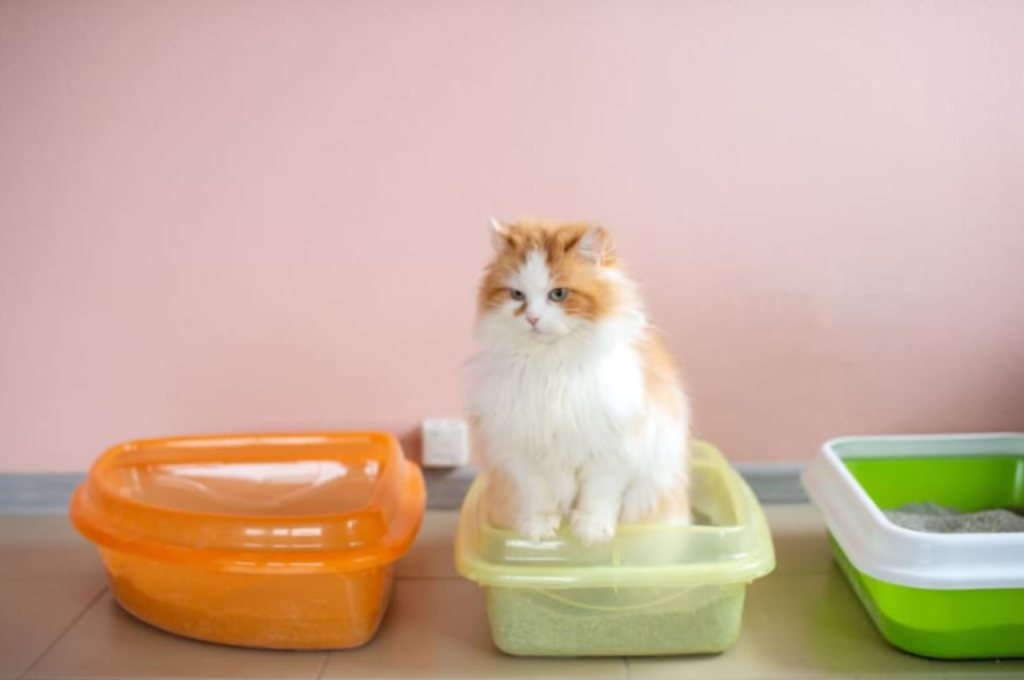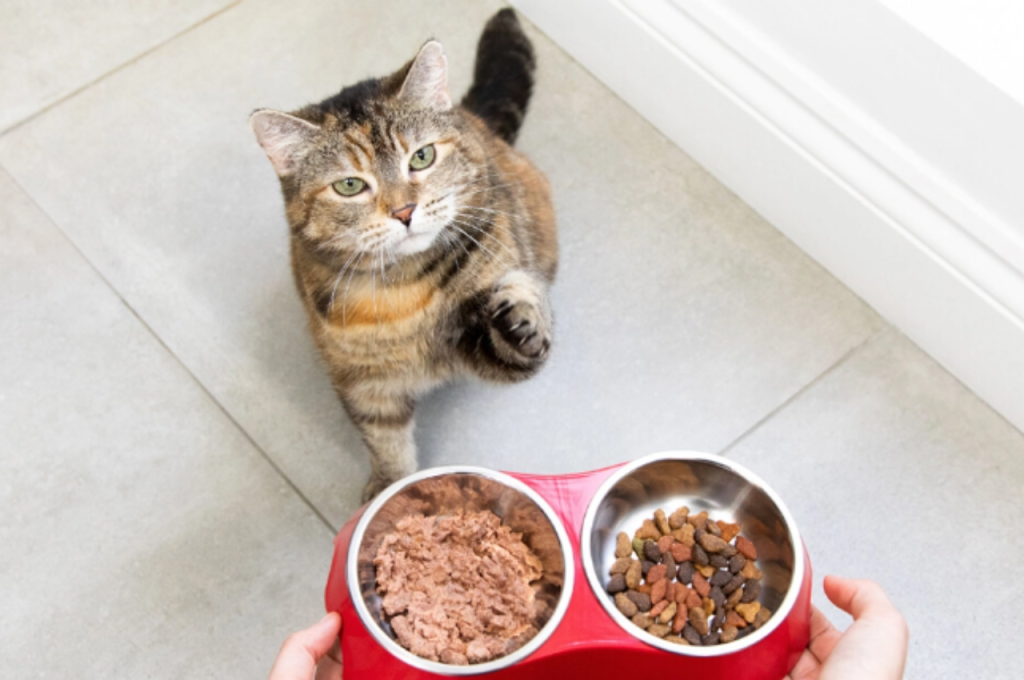No, Cats should not be fed KFC as it can be harmful to their health. Feeding cats KFC is not recommended as the ingredients in fast food can be harmful to their digestive system.
Cats have specific dietary requirements that are best met with balanced cat food designed for their needs. It is important to prioritize their health and well-being by providing them with a nutritious diet that supports their overall health. If you want to treat your cat, opt for cat-friendly treats or consult with a veterinarian for safe options.
Your cat’s health should always come first when making feeding decisions.
1. Can Cats Eat Fast Food?
Wondering if cats can have fast food like KFC? It’s best to stick to their regular diet as fast food can be harmful to their health. Cats require a balanced diet to thrive, so it’s important to avoid feeding them high-fat and processed foods.

For many pet owners, sharing a treat like KFC with their furry friend can seem harmless, but it’s vital to consider whether cats can eat fast food safely. Let’s explore the facts.
1.1. Understanding A Cat’s Diet
Cats are obligate carnivores, meaning their diet should mainly consist of animal-based proteins for optimal health. Their bodies are not designed to digest the ingredients found in fast food.
- Cats require high-quality meat in their diet for essential nutrients.
- A balanced diet for cats includes proteins, fats, vitamins, and minerals.
- Too much-processed food can lead to obesity and other health issues in cats.
1.2. The Dangers of Fast Food for Cats
Fast food can be harmful to cats due to its high levels of salt, fat, and artificial additives. Cats may experience digestive upset, obesity, and other health problems if they consume fast food regularly.
- Salt in fast food can lead to dehydration and kidney issues in cats.
- Processed fats can cause digestive disturbances and weight gain in cats.
- Artificial additives in fast food can trigger allergic reactions and digestive issues in cats.
2. KFC: A Closer Look at the Ingredients
A globally recognized fast-food chain famous for its fried chicken and an array of side dishes. While many people enjoy indulging in KFC’s offerings, it’s essential to understand the ingredients used in their menu items, especially for those considering sharing their meals with their pets.
2.1. Analysis of KFC’s Chicken
It’s important to avoid feeding KFC chicken to cats because of its high salt and seasoning content. Excessive salt intake can be detrimental to cats’ health and may lead to various health problems.
2.2. The Impact of Spices and Additives
The seasonings used in KFC can potentially upset a cat’s stomach and lead to digestive issues. Additionally, additives like garlic and onion powder found in KFC can be toxic to cats. Therefore, it’s best to avoid feeding KFC ingredients to cats to ensure their well-being and prevent any adverse health effects.
3. Why Feeding KFC to Cats is Harmful
Cats are adorable creatures who bring joy and happiness to our lives. As responsible pet owners, we want to ensure their well-being and provide them with a nutritious diet. While it may be tempting to share our favorite fast food indulgence, KFC, with our feline friends. It is important to understand the potential health risks and nutritional imbalance that can arise from feeding them this type of food.
3.1. Potential Health Risks
Feeding KFC to cats can pose various health risks. Firstly, the high salt content in KFC can be detrimental to their health. Cats are more sensitive to salt than humans, and excessive salt intake can lead to dehydration and kidney problems.
Another significant concern is the spices and flavorings used in KFC. Many of these seasonings, such as onion and garlic powder, can be toxic to cats. These ingredients can cause gastrointestinal upset, anemia, and even damage to their red blood cells.
Furthermore, the cooking oils used in KFC, often high in unhealthy saturated fats, can lead to obesity and other associated health issues in cats. Obesity can increase the risk of heart disease, diabetes, and joint problems, significantly impacting their quality of life.
3.2. Nutritional Imbalance
Feeding KFC to cats can result in a significant nutritional imbalance in their diet. Cats are obligate carnivores, and their bodies require specific nutrients found primarily in meat. KFC, on the other hand, is high in carbohydrates and lacks essential cat-specific nutrients like taurine, which is vital for their heart and eye health.
Moreover, KFC may not provide the appropriate balance of protein, fat, and micronutrients that cats need to thrive. This can lead to malnutrition, weakened immune systems, and various health complications. It is crucial to prioritize a well-balanced, species-appropriate diet for our furry companions.
Instead of KFC, opt for high-quality cat food that meets their nutritional requirements. Consult with your veterinarian to ensure you are providing the best diet for your overall health and well-being. Remember, a healthy and happy cat starts with a proper diet!
4. Signs of Fast Food Toxicity in Cats
If you suspect that your cat has consumed KFC or other types of fast food, it’s crucial to monitor them for signs of fast food toxicity. These signs may include gastrointestinal issues such as vomiting, diarrhea, or stomach upset. Additionally, you may observe changes in behavior or appetite, lethargy, weakness, or even more severe symptoms such as difficulty breathing or seizures. It’s essential to seek immediate veterinary care to ensure their well-being and receive appropriate treatment.

4.1 Vomiting and Diarrhea
Consuming fast food can lead to vomiting and diarrhea in cats, potentially resulting in dehydration.
4.2 Decreased Appetite
Decreased appetite is a common indicator of fast food toxicity in cats, resulting from gastrointestinal issues.
5. Safer Alternatives to Treat Your Feline Friend
Cats may be curious creatures, but when it comes to their diet, one must be cautious. While it can be tempting to share your KFC with your furry friend, it’s important to consider the potential risks. Fortunately, there are safer alternatives that can satisfy your feline friend’s cravings without putting their health at stake. Let’s explore some of these options below.
5.1. Protein-rich Homemade Meals
Cats thrive on a protein-rich diet, and homemade meals can provide a great way to cater to this need. Creating meals with high-quality proteins, such as cooked chicken or turkey, can offer a tasty and nutritious alternative to KFC. Additionally, incorporating vegetables and grains can further boost the nutritional value of these homemade meals, ensuring your cat receives a well-balanced diet.
5.2. Commercial Cat Food Options
When it comes to commercial cat food, several trusted brands offer a wide range of options to cater to your cat’s dietary needs. Look for products that are specifically formulated for cats and have undergone rigorous testing to ensure they are safe and nutritionally sound. Opting for wet or dry food that contains high-quality proteins, essential vitamins, and minerals can provide a convenient and healthy alternative to KFC.
6. How to Transition Your Cat to A Healthier Diet
Cats are obligate carnivores, meaning their diet should primarily consist of meat. Transitioning your cat to a healthier diet is crucial for their well-being. Here are some essential steps to help guide you through this process.
6.1. Gradual Diet Change
Slowly introduce new foods by mixing them with their current diet to prevent digestive upset. Gradually increase the new food proportion while decreasing the old food over several weeks.
6.2. Consulting A Veterinarian
Seek professional advice from a veterinarian to determine the best diet plan for your cat. Veterinarians can provide customized recommendations based on your cat’s specific needs.
7. Maintaining A Balanced Diet for Your Cat
When it comes to maintaining a balanced diet for your feline friend, it’s essential to be mindful of their nutritional needs and portion sizes. Cats, just like humans, require a proper balance of nutrients to ensure optimal health and well-being. Here are some crucial aspects to consider when providing your cat with a well-balanced diet.
7.1. Understanding Nutritional Requirements
Cats have specific nutritional requirements that differ from those of humans. Protein, amino acids, essential fatty acids, minerals, and vitamins are all essential for your cat’s overall health. Cats are obligate carnivores, meaning they require a diet rich in animal-based proteins, particularly taurine, to support their unique metabolic needs.
7.2. Monitoring Portion Sizes
When it comes to maintaining a balanced diet for your cat, portion control is key. Monitoring portion sizes helps prevent overfeeding and obesity. It’s important to follow feeding guidelines provided by your veterinarian or the cat food manufacturer to ensure you are meeting your cat’s nutritional needs without overfeeding.

Conclusion
It is not recommended for cats to have KFC. While cats may enjoy the taste of fried chicken, it is important to prioritize their health and nutrition. KFC contains ingredients that can be harmful to cats and may lead to digestive issues.
As a responsible pet owner, it is best to stick to a balanced diet specifically formulated for cats to ensure their overall well-being.
